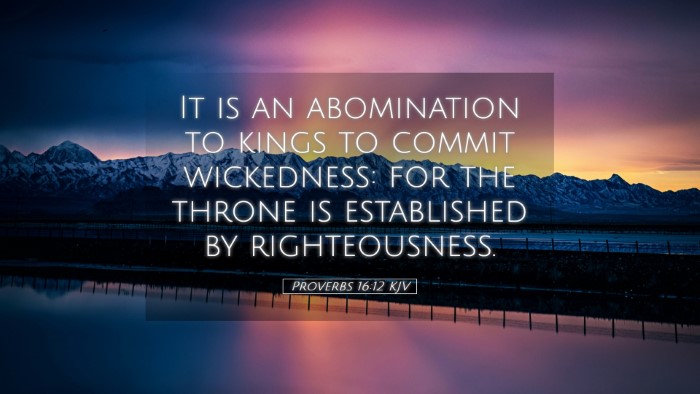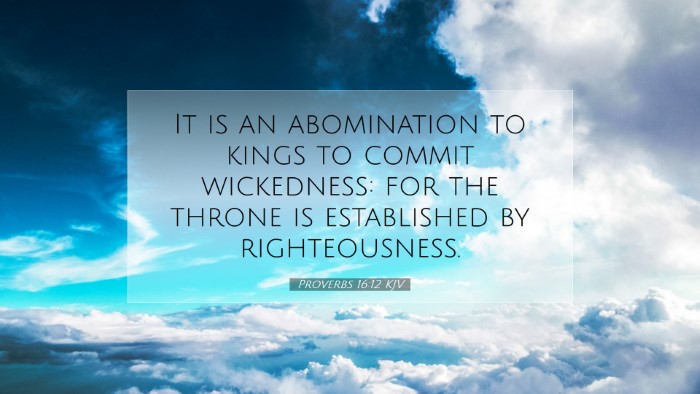Commentary on Proverbs 16:12
Verse: “It is an abomination to kings to commit wickedness: for the throne is established by righteousness.”
Introduction
The verse under consideration, Proverbs 16:12, addresses the moral responsibilities of rulers and the foundational principles upon which authority is built. This commentary seeks to explore the depths of this wisdom literature with insights drawn from notable public domain commentaries.
Insights from Matthew Henry
According to Matthew Henry, this verse underscores the abhorrence that kings have toward wickedness. He emphasizes that a king, who is entrusted with authority, is held to a higher standard of righteousness. Henry suggests that the moral integrity of leaders is crucial for the well-being of their subjects and that when rulers err, it undermines the very foundation of their thrones.
- Wickedness and its Consequences: Henry notes that wickedness, particularly in leadership, results in chaos and disharmony within society. The integrity of a king is meant to reflect righteousness, and deviation from this leads to dire consequences for the community.
- The Role of Righteousness: He further discusses how a ruler’s throne, symbolizing their authority, is established and maintained by righteous governance. A corrupt administration not only fails to protect its citizens but also invites divine judgment.
Insights from Albert Barnes
Albert Barnes interprets this verse with an emphasis on the divine decree that supports the moral governance of rulers. He mentions that kings are to govern with justice, as it is the very essence of their authority.
- The Abomination of Wickedness: Barnes points out that the term "abomination" denotes something that is intensely detestable. For kings, engaging in wickedness not only tarnishes their reputation but also breaches the covenantal relationship between God and His leaders.
- Establishment of Thrones: Barnes elaborates on the idea that a throne's legitimacy and endurance are rooted in righteousness. A king’s power is divinely sanctioned, and to operate in wickedness is to act contrary to God's intention for leadership.
Insights from Adam Clarke
Adam Clarke provides a thorough analysis of the societal implications of this verse. He asserts that righteous governance is paramount for the prosperity of a nation, and rulers must be examples of virtue to lead effectively.
- Implications for Society: Clarke states that when a king commits wickedness, it sets a poor example for the populace, eroding moral standards throughout the kingdom. The consequences ripple through every level of society.
- The Contrast of Righteousness: He draws a contrast between the transient nature of power sustained by corruption and the stability of authority grounded in righteousness. True power is not only recognized but respected and upheld through justice.
Theological Implications
In light of the comments from these esteemed scholars, we can delineate several key theological implications:
- The Sovereignty of God: Each commentary reaffirms the belief that God establishes authority and expects righteousness from those in power. This sovereignty undergirds the moral fabric of leadership.
- The Nature of Righteousness: Righteousness is not merely an abstract concept but is actionable, requiring rulers to govern with justice, mercy, and truth.
- The Responsibility of Leadership: Pastors and leaders are urged to take this verse to heart, understanding that their influence shapes the spiritual and moral climate of their communities.
Practical Applications
Insights drawn from Proverbs 16:12 encourage not only kings but all forms of leaders to reflect on their moral responsibilities:
- Self-Examination: Leaders should regularly evaluate their actions against the standard of righteousness prescribed in Scripture.
- Advocacy for Justice: Encourage leaders to promote justice and equity within their domains, advocating for policies that reflect biblical principles.
- Education in Righteousness: It is vital to cultivate an understanding of righteousness among future leaders through teaching and mentorship.
Conclusion
Proverbs 16:12 serves as a solemn reminder of the weighty responsibility borne by those in authority. The insights drawn from public domain commentaries highlight the Bible's consistent call for righteousness in leadership, ultimately rooted in the character of God. As such, pastors, students, and theologians are urged to remain vigilant and committed to upholding the principles of justice and morality in all spheres of influence.


